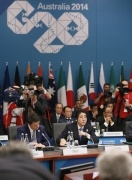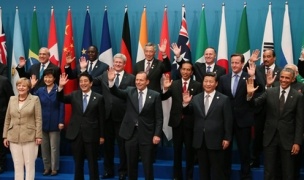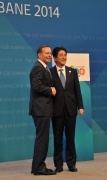G20 (Summit on Financial Markets and the World Economy)
G20 Brisbane Summit (Summary)
 (Photo: Cabinet Public Relations Office)
(Photo: Cabinet Public Relations Office)
 (Photo: Cabinet Public Relations Office)
(Photo: Cabinet Public Relations Office)
 (Photo: Cabinet Public Relations Office)
(Photo: Cabinet Public Relations Office)
1. Date, location and participants
(1) Date and location
November 15 and 16, 2014; Brisbane, Australia
(2) Participating countries and international organizations
- a) G20: G7 (Japan, Canada, France, Germany, Italy, U.K., U.S. and EU), Russia, Argentina, Australia, Brazil, China, India, Indonesia, Republic of Korea, Mexico, Saudi Arabia, South Africa and Turkey.
- b) Invited countries: Spain, Myanmar (ASEAN Chair), Mauritania (African Union (AU) Chair), Senegal (New Partnership for Africa’s Development (NEPAD) Steering Committee Chair), Singapore and New Zealand.
- c) Financial Stability Board (FSB), International Labour Organization (ILO), International Monetary Fund (IMF), Organisation for Economic Co-operation and Development (OECD), United Nations (UN), World Bank (WB) and World Trade Organization (WTO).
2. Overview
(1) Introduction
Strengthening growth and creating jobs was positioned as the top priority of this Summit, and the leaders conducted a frank exchange of views on specific actions to achieve this. The G20 Leaders’ Communique was adopted at the Leaders’ Summit’s conclusion.
Additionally, along with the Leaders’ Communique, the “Brisbane Action Plan” for lifting the collective GDP level of the G20 by at least an additional 2% by 2018 and a “Comprehensive Growth Strategy” for each of the G20 countries was announced. Moreover, with regards to the urgent issue of the Ebola outbreak, a G20 Leaders’ Statement was delivered on the first day of the Summit.
Overviews of the discussions on each topic are as follows:
(2) Global economy (strengthening growth and creating jobs)
- a) Concerning the global economy, the leaders welcomed stronger growth in some key economies, and shared views that they will continue to coordinate in order to achieve strong, sustainable and balanced growth.
- b) Prime Minister Shinzo Abe mentioned that Japan slipped into deflation from the 1990s, while explaining the reform initiatives and experiences of the Abe Administration thus far to overcome deflation. In particular, Prime Minister Abe outlined the results of the government’s economic policies through the powerful implementation of the “three arrows” , pointing out that a positive economic cycle is being created, with steady progress to overcome deflation and recovery in growth potential, while also noting that Japan continues to face lingering challenges. Furthermore, Prime Minister Abe touched on the consumption tax rate increase implemented this April, and explained that the decision on lifting the rate to 10% will be made in accordance with the law subsequently.
- c) Prime Minister Abe outlined Japan’s approach to supporting infrastructure development (achieving high quality infrastructure development and robust, sustainable economic growth through people-centered investment). He also stated that economic participation of women is important for economic growth, and introduced Japan’s specific initiatives and outcomes, including the “World Assembly for Women in Tokyo: WAW! Tokyo 2014” held in September.
(3) Trade
- a) Regarding trade, there was a shared recognition among leaders that trade is a driver for strengthening economic growth and creating jobs, and that the WTO is the backbone of the multilateral trade system. Likewise, the importance of resisting protectionism was pointed out, and the significance of standstill (not introducing new protectionist measures) and rollback (rectifying existing protectionist measures) commitments was reconfirmed.
- b) Prime Minister Abe emphasized that in order to achieve the goal of lifting the collective GDP level of the G20 by at least an additional 2% by 2018, it will be essential to maintain and strengthen the multilateral trade system under the WTO, and promote high-level economic partnerships. Additionally, Prime Minister Abe commented on the WTO Doha Round Negotiations (the Bali Agreement), and said he appreciates the recent positive moves to advance the situation. Prime Minister Abe also explained that Japan intends to strategically and swiftly promote negotiations on the TPP and eight EPAs, including the Japan-EU EPA, and contribute to creating a framework for free trade that benefits the world.
(4) Resilient global economy
- a) International taxation: Progress with the OECD Committee on Fiscal Affairs’ work on the “BEPS Action Plan” was welcomed, and the view was shared that automatic exchange of tax information related to non-resident financial account information should commence promptly.
- b) Financial regulation reform: The leaders welcomed the largely completed work which has been moving ahead as a response to the financial crisis, and shared the view that it will be important for each country to steadily implement international agreements in order to ensure that growth is supported by a stable financial system. The leaders also concurred in welcoming the proposal by the FSB (Financial Stability Board) concerning the capacity to absorb total losses in order to prevent taxpayers being burdened when massive banks fail.
- c) IMF reform: Participating countries expressed expectation that the IMF reform of 2010 will come into effect quickly.
(5) Energy and climate change
- a) Energy: Based on the recognition that a resilient energy market is essential for economic growth, the leaders shared the views that further coordination in the energy field is needed, and the G20 Principles on Energy Collaboration were endorsed. At the same time, the G20 Energy Efficiency Action Plan was endorsed based on the perspective that improving energy efficiency is conducive to economic growth and energy security.
Prime Minister Abe explained that thermal power generation, including coal-fired thermal power generation, is an important global resource, and that Japan will contribute to improving the world’s energy efficiency by making this energy as highly efficient and low carbon as possible via support for developing countries, and by disseminating the world’s most advanced clean energy technologies. In addition, he explained that natural gas, including LNG, is an essential energy resource alongside petroleum, and elaborated on the importance of creating a flexible and competitive gas market, particularly the importance of relaxing destination clauses. - b) Climate change: The significance of adopting a fair and effective framework in which all countries participate at next year’s COP21 was recognized. Prime Minister Abe explained Japan’s initiatives, including that it will contribute to its fullest extent at COP21, and as a part of this, is contributing up to 1.5 billion U.S. dollars to the Green Climate Fund (GCF), if the Diet’s approval can be obtained and while taking into consideration the size of each country’s contribution.
- c) Development: Prime Minister Abe stated that the post-2015 Development Agenda should be based on the concept of human security, and from that perspective Japan is placing an emphasis on universal health coverage (UHC) and disaster reduction. Also, regarding disaster reduction, he manifested his expectations for the success of the Third United Nations World Conference on Disaster Risk Reduction that will be held in Sendai next March.
(6) Measures to combat the Ebola virus disease
It was reaffirmed that the Ebola outbreak poses a serious threat to international peace and stability, and the view was shared that the international community will make a coordinated response. The G20 Leaders’ Brisbane Statement on Ebola was issued.
3. Upcoming G20 Summit Meetings
Turkey is scheduled to host the G20 Summit in 2015, and China is scheduled to host the G20 Summit in 2016.

